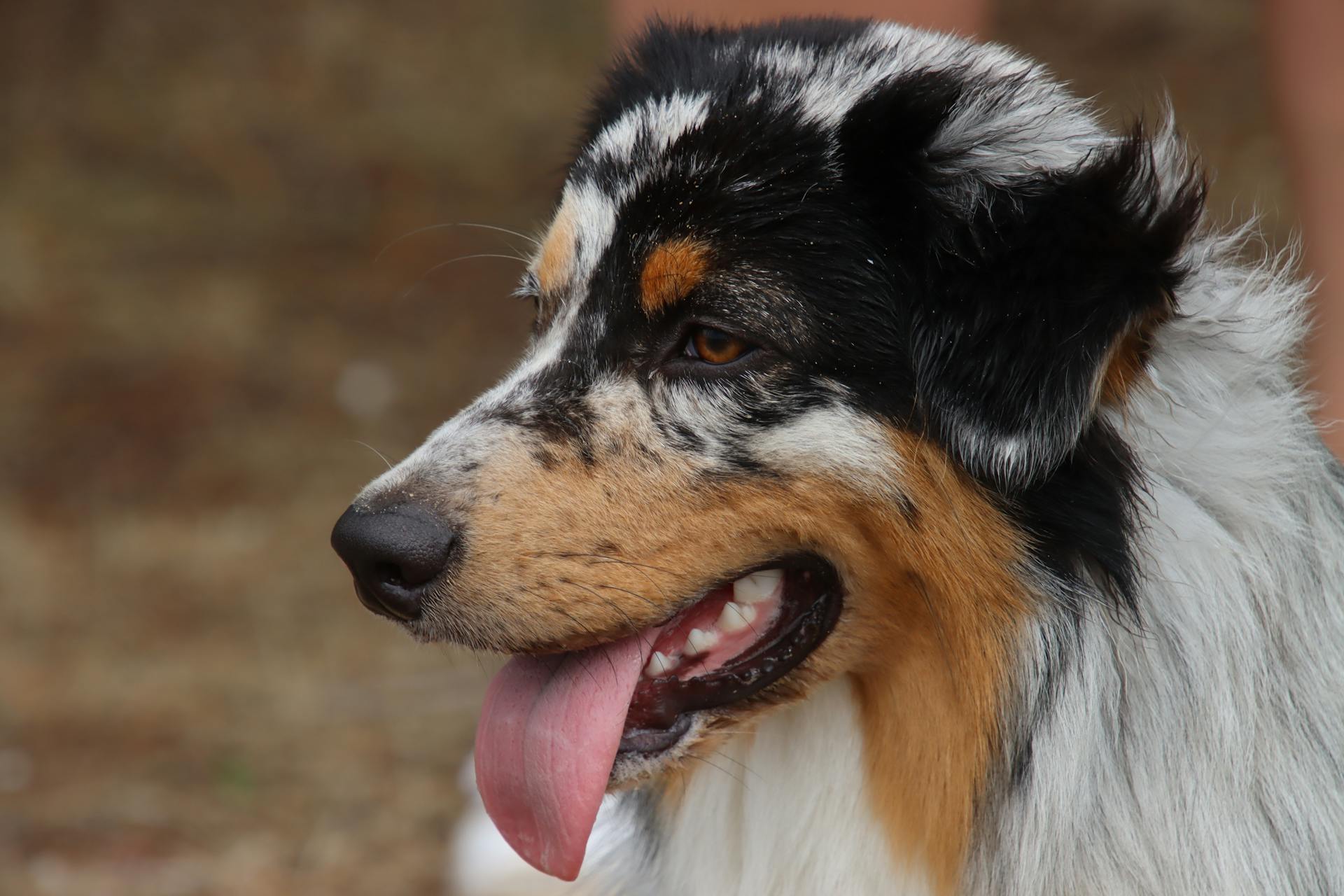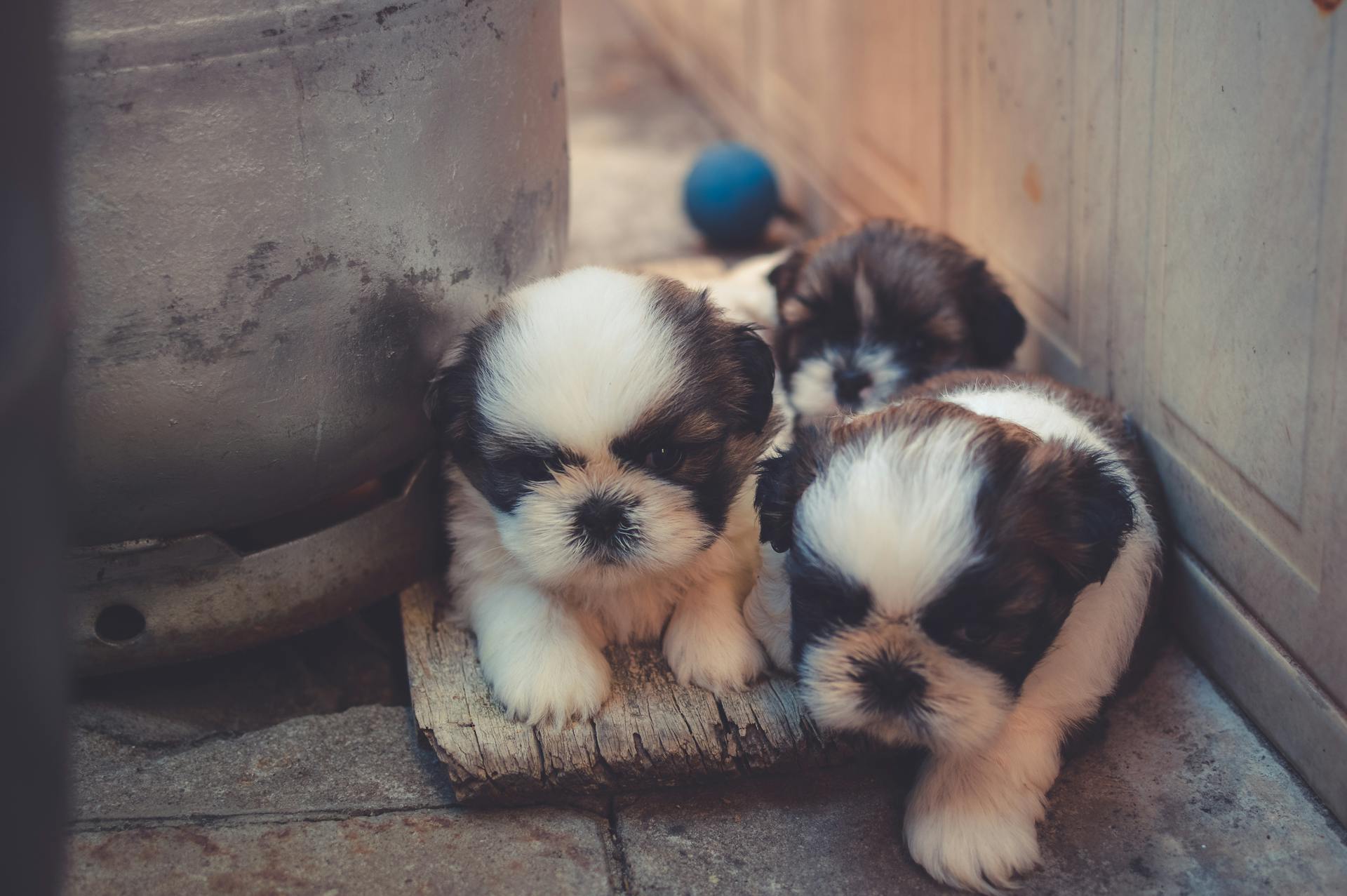
If you're considering bringing a Poodle into your family, you're likely weighing the pros and cons of the Mini Poodle versus the Standard Poodle.
Both Mini and Standard Poodles are intelligent and active breeds, but they have distinct differences in size and grooming needs. Mini Poodles typically weigh between 10-15 pounds and stand 11-14 inches tall, while Standard Poodles can weigh between 40-70 pounds and stand 15-20 inches tall.
Mini Poodles are ideal for apartment living due to their smaller size, but they still require regular exercise to stay happy and healthy. Standard Poodles, on the other hand, need plenty of space to run around and play.
Ultimately, the decision between a Mini Poodle and a Standard Poodle comes down to your lifestyle and preferences.
Readers also liked: Tall Poodle Looking Dog
Poodle Types
There are six types of Poodles with size variants. The American Kennel Club (AKC) recognizes three of them: Toy Poodles, Miniature Poodles, and Standard Poodles.
The AKC recognized Toy, Miniature, and Standard Poodles are the most well-known types of Poodles. Many people are familiar with these three varieties.
There are three other types of Poodle: the Moyen Poodle, the Teacup Poodle, and the Giant/Royal Poodle. These types are less commonly recognized than the AKC varieties.
Poodle mixes are also considered different types of Poodles. They are often created by breeding a Poodle with another breed of dog.
Recommended read: Types of Toy Poodles
Choosing the Right Poodle
To find the perfect Poodle for you, consider your lifestyle and what you're looking for in a furry companion. Ask yourself questions like how much time you're willing to spend exercising a dog every day and what types of activities you want to do with your dog.
Your living situation is also a crucial factor. If you have a small space, a smaller Poodle may be a better option. Poodles of all sizes need regular exercise, but larger Poodles require more space and can be more costly.
Here are some key factors to consider when choosing the right Poodle size for you:
- Exercise time: How much time are you willing to spend exercising a dog every day?
- Space: What is your living situation like, and do you have room for a larger Poodle?
- Cost: What is your budget for food and grooming, and can you afford the expenses of a larger Poodle?
- Grooming needs: Do you have the time and resources to keep up with a Poodle's grooming needs?
Remember, all Poodles, regardless of size, need to be socialized, fed a nutritious dog food, and trained with positive reinforcement.
Choosing What's Right for You
The Moyen Poodle is a great option for those who want a smaller dog, but they can be harder to find and more expensive.
In the United States, many Moyen Poodles would be categorized as smaller Standard Poodles, but in Europe, they are considered a distinct size.
On a similar theme: Moyen vs Standard Poodle
If you're short on space, a smaller poodle may be a better fit, but if you have the room and resources, a larger poodle can be a great companion.
Standard Poodles can be quite large, but they also require more food and grooming, which can add to their overall cost.
To choose the right poodle size for you, consider your lifestyle and what you're looking for in a furry companion. Ask yourself questions like how much time you have to exercise a dog, what types of activities you want to do with your dog, and what your budget is for food and grooming.
Here are some factors to consider when choosing a poodle size:
Ultimately, the best poodle size for you will depend on your individual needs and circumstances.
Poodles
Poodles are known for their intelligence, making them highly trainable and a popular choice for obedience competitions. They come in different sizes, including miniature poodles.
Miniature poodles are a great fit for families with small living spaces or apartments, and they thrive in indoor activities. They are also adaptable and can make great companions.
Miniature poodles weigh between 10 and 15 pounds and stand between 10 and 15 inches tall at the shoulder. They have a friendly and affectionate personality, making them a great addition to any family.
These dogs love to be around people and are playful, which makes them a great choice for families with children. They are also known for their outgoing personalities and love to be the center of attention.
Miniature poodles have a curly, hypoallergenic coat that requires regular grooming to prevent matting and tangling. With proper care, they can live a long and happy life as a beloved pet.
A fresh viewpoint: Standard Poodle Great Dane Mix
Poodle Care
Poodles are known for their low-shedding, curly coats that require regular brushing to prevent matting and tangling.
Daily brushing is essential to keep their curls looking their best, but it's also a great way to bond with your poodle.
Poodles need exercise to stay happy and healthy, and they love activities like swimming, playing fetch, and going for walks and runs with their owners.
Toy Poodles and Teacup Poodles require less exercise than Standard Poodles due to their smaller size, but all types of Poodles need regular physical activity to stay healthy.
Standard Poodles and Miniature Poodles require regular grooming, including brushing and clipping, to keep their coats in good condition.
A short, practical fur style like a puppy cut or teddy bear cut can save owners time and effort, but it still requires daily brushing.
Poodles are highly trainable and respond well to positive reinforcement training methods, making them a great choice for first-time dog owners.
For your interest: Low Maintenance Standard Poodle Cuts
Basic Care
Poodles don't shed much because they have a thick, curly coat that needs regular brushing to prevent tangles and mats.
You'll want to brush your Poodle every day if you choose a short, practical fur style like a puppy cut or teddy bear cut, as this will help prevent matted fur.
Intriguing read: Standard Poodle Show Cut
Poodles have to be shaved if they aren't brushed to the skin, which can become a big mess.
Poodles love and need exercise because they were originally hunting dogs.
They enjoy different activities, especially swimming, and are hardwired to retrieve, so they love to play fetch.
Walking and jogging with their humans are also fun for them.
Toy Poodles and Teacup Poodles don't require as much exercise as Standard Poodles because a little is a lot of movement for their tiny bodies.
Poodle puppies should not be overexercised to prevent damage to their growth plates and joints.
You might enjoy: Standard Poodle Exercise Needs
Grooming
Poodles have a thick, curly coat that doesn't shed much, but it does require regular brushing to prevent tangles and mats.
Brushing your Poodle daily is a must, especially if you opt for a longer coat style.
Poodles that aren't brushed regularly will need to be shaved, which can be a big mess.
A short, practical fur style like a puppy cut or teddy bear cut is a great option for Poodle owners who want to avoid frequent grooming sessions.
Discover more: Standard Poodle Continental Cut
Toy Poodles and Teacup Poodles require less brushing due to their smaller size, but all Poodles need daily brushing regardless of size.
Poodles need regular visits to a professional groomer every 6-8 weeks for a haircut, regardless of size.
Standard Poodles require more grooming than Miniature or Toy Poodles due to their larger size.
Poodles love to swim and enjoy different activities, but they still need regular grooming to stay healthy and prevent matting.
Additional reading: Standard Poodle Grooming
Diet and Exercise
Standard poodles require regular exercise and playtime to burn off excess energy and prevent boredom.
Daily walks and playtime are essential for keeping your poodle happy and healthy.
Miniature poodles also require regular exercise, making them a great choice for active families.
High-quality dog food is a must for toy poodles, as they have small stomachs and need a diet rich in nutrients.
Toy poodles should be fed dog food that's easy to digest, as their small stomachs can't handle rich or heavy foods.
Readers also liked: Standard Poodle Dog Food
Standard poodles need regular grooming, including brushing and clipping, to keep their coats in good condition.
Regular grooming is also essential for miniature poodles, as it helps prevent matting and tangling of their fur.
Positive reinforcement training methods work well for all poodle sizes, making training a breeze.
With consistent exercise and training, poodles can thrive in a variety of living situations.
Poodle Health and Training
Toy Poodles are highly intelligent and can be trained easily with positive reinforcement training methods.
Socialization is also necessary for Toy Poodles to help them develop good behavior and interact well with other animals and people.
Poodles are known for their intelligence and trainability, making them a popular choice for many pet owners.
Poodles are prone to specific health issues, including hip dysplasia, patellar luxation, epilepsy, and progressive retinal atrophy, which can be prevented or managed with regular veterinary check-ups and proper nutrition and exercise.
Care and Training
Regular exercise is essential for poodles, with daily walks and playtime helping to burn off excess energy and prevent boredom.
Standard, miniature, and toy poodles all require regular grooming, including brushing and clipping, to keep their coats in good condition.
Poodles are highly trainable and respond well to positive reinforcement training methods, making them a great choice for many pet owners.
Socialization is also necessary for poodles to help them develop good behavior and interact well with other animals and people.
Poodles are highly intelligent and can be trained easily, especially with positive reinforcement training methods.
Consistency is key in poodle training, with a routine and positive reinforcement techniques helping to encourage good behavior.
Poodles are social animals and should be exposed to different people, animals, and environments to help them develop good behavior and confidence.
Punishment is not an effective training method for poodles, and instead, focus on positive reinforcement to encourage good behavior.
Training a poodle takes time and patience, so don't get frustrated if they don't learn a command right away, just keep practicing and be patient.
A fresh viewpoint: Training a Standard Poodle
Health Considerations
Poodles are generally a healthy breed, but like all dogs, they can be prone to certain health issues. Hip dysplasia is a common problem that can cause arthritis and mobility issues.
Regular veterinary check-ups are crucial to catch any potential health problems early on. This can help prevent or manage issues like patellar luxation, which can cause knee pain and discomfort.
Epilepsy is another health concern that poodles may face, and it's essential to work with a veterinarian to develop a treatment plan. With proper care and management, many poodles with epilepsy can lead happy and healthy lives.
Progressive retinal atrophy is a condition that can cause vision loss and blindness, and it's often inherited. Responsible breeding practices can help reduce the risk of this condition in poodles.
You might like: Standard Poodle Health Concerns
AkC Recognized
The AKC recognizes three sizes of Poodles: Toy, Miniature, and Standard. Each size has its unique characteristics.
The Toy Poodle is the smallest, standing at 10 inches or less in height. The Miniature Poodle is slightly taller, ranging from 10-15 inches in height.
On a similar theme: Akc Miniature Poodle
The Standard Poodle is the largest, measuring over 15 inches in height. This size difference affects their weight, with Toy Poodles weighing between 4-6 pounds, Miniature Poodles weighing 10-15 pounds, and Standard Poodles weighing 40-70 pounds.
Despite their size differences, all Poodles have a similar lifespan, ranging from 10-18 years. This means that with proper care and attention, you can enjoy the company of your Poodle for nearly two decades.
Their activity level varies, with Toy Poodles being relatively low-energy, Miniature Poodles being high-energy, and Standard Poodles also being high-energy. If you're an active person, a Standard or Miniature Poodle might be a great fit.
It's worth noting that Poodles are known for their low-shedding coat, but they do require regular brushing to prevent mats and tangles. If you brush them daily, you can reduce the need for frequent grooming visits. However, if you neglect their grooming, their fur can form cords due to their water-repellent nature.
Take a look at this: Miniature Poodle Black and White
Frequently Asked Questions
Are miniature Poodles just as smart as standard Poodles?
Yes, all Poodles, regardless of size, are highly intelligent and ranked as the second smartest dog breed. Intelligence is not size-dependent in Poodles, making them a great choice for owners who value mental stimulation.
Are mini Poodles more hyper than standard Poodles?
Miniature poodles tend to be more energetic than standard poodles, but less hyper than toy poodles. Regular grooming and exercise can help manage their energy levels.
Which size Poodle has the best temperament?
All three sizes of Poodles - Standard, Toy, and Miniature - share similar friendly and playful personalities, making them great family dogs.
Sources
Featured Images: pexels.com


